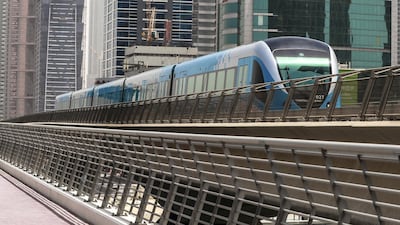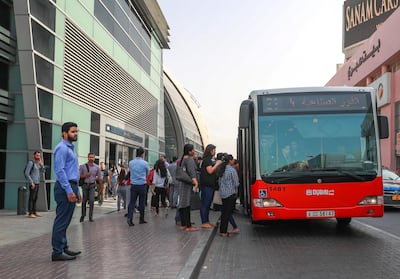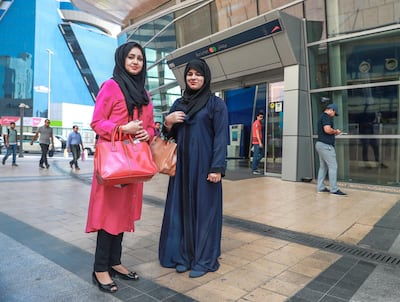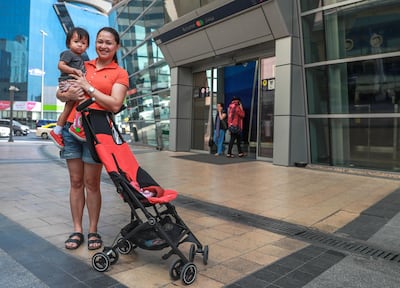The Dubai Metro has been praised for changing users' perceptions about public transport, as it marks the ninth anniversary of its launch on Sunday.
Commuters say the network saves time and money, and even helps them make friends.
The metro was officially opened on September 9, 2009 by Sheikh Mohammed bin Rashid, Vice President and Ruler of Dubai, to tackle the city's congestion problems sparked by a population boom.
It started with 10 stations on the red line. The green line was launched two years later and the number of stations grew to 49. Together, the lines serve about 350,000 passengers a day, and more than 100 million journeys were made last year.
A big part of the metro's appeal has been the price. Travelling within one zone costs only Dh3 in standard class, while a trip on the whole line is Dh7.50.
As rush hour grips traffic on the Dubai-bound side of Sheikh Zayed Road, the metro rolls into the Noor Bank and Financial Centre stations, arriving at BurJuman about 10 minutes later.
Motorists can face at least 40 minutes' delay to reach the same destination.
"Dubai Metro has contributed in changing the public's perception about public transport," said Georgie Babu, 32, an Indian who was among the passengers waiting to get on the metro at Noor Bank.
“It has promoted public transport among all segments of the city’s society. I have travelled around and used metro stations in the US and India. Dubai’s Metro is way more organised, cleaner and faster.”
Smruti Dajjar, an Indian living in Al Nahda, said travelling by metro greatly reduced her commute from Sharjah to her job in Dubai.
"You can imagine the traffic chaos towards Al Quoz area," Ms Dajjar said. "The public transport system is becoming a more reliable, safe, clean and efficient alternative to the car.
"The new technology being harnessed in driverless transport means the metro provides several benefits, including a high degree of automation and the removal of human error. It just makes me feel safer."
_______________
Read more:
Dubai reaped $18bn in benefits from Metro system
Dubai Metro passenger numbers rise
New name for Jumeirah Lakes Towers metro station
_______________
Gehad Haraz, 35, an Egyptian who started using the metro in 2013, said: “I cannot imagine what the roads would be like without the metro. It saves time and money. The cost of the trip is very cheap.”
Mr Haraz takes the metro from Jumeirah Lakes Towers towards Noor Bank station.
“I work in a medicine store in Al Quoz and it’s my only means to reach work,” he said. “When I came to the country in 2012, the company provided a bus to transport workers.
"The journey to work was affected by traffic. Driving from takes about 40 minutes, but it takes only 20 on the metro."
Jailene Buhayan, 29, a Filipina living in Dubai for four years, says her metro journeys have allowed her to forge new friendships.
“I met many friends from the Philippines in the women’s carriage on the metro,” the receptionist said.
But a Pakistani banker who was standing near a metro station in BurJuman said he still preferred driving his car because he would otherwise have no place to keep it.
"I commute from Abu Hail to BurJuman," said Mohammed Haroun, 30. "Using the metro might be cheaper, but where would I park my car for free? Most of the parking lots are now prepaid."
Umm Kulthum Hayat, a Pakistani financial adviser living in Sharjah, had no intention of going back on the road.
"The metro has made it much easier to move around the city," Ms Hayat, 24, said. "I have been using it for almost six years. I do not want to buy a car at all."
Heba Shekik, a Pakistani who has used the metro for four years, has also been pleased with the savings..
"Driving is very expensive with the cost of petrol and Salik," Ms Shekik said. "It is more convenient to use the metro."
Filipina housewife Ronalin Adolfo feels her son, 15, is in “safe hands” when he travels on Dubai Metro from their Healthcare City home.
"The metro has offered commuters a viable alternative to road transport," Ms Adolfo, 38, said. "I taught my son how to use the metro. He takes it to and from school in Oud Metha.
Mahmoud Kramah, 35, from Jordan, said the metro is a great way to see the city.
“People living in the country have become used to the metro and have stopped paying attention to the beautiful views it offers while riding on it,” Mr Kramah said.
“Most of my friends and relatives always ask to ride on the metro when they visit the UAE.”




